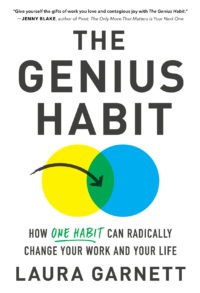Our editors independently select these products. Making a purchase through our links may earn Well+Good a commission
The one habit to build in 2019 for unlimited success at work
Want to find unlimited success in 2019 and beyond? "The Genius Habit" author explains why weekly performance tracking is the best work habit to start doing.

There’s nothing like the start of the New Year to make us take stock in who we’ve been and who we want to be. Often, at the core of regrets and goals alike are certain behavioral habits. So it stands to reason that our habits have a large influence are on who are.
And we all know that there are good and bad habits: Some, like taking the stairs rather than the escalator, clearly lean toward the positive, while a less-than-stellar habit might be drinking six cups of coffee every morning. But what about the less obvious habits, like the ones we create at work? Some may keep us stuck in roles that don’t quite fit while others allow us to outperform and reach heights of success we didn’t know were possible.
The key to understanding how to make and break habits is understanding the anatomy of them: a cue, a routine, and a reward. For example, I work out five days a week, and the cue is my calendar. The routine is going into my gym, changing my clothes, and starting to exercise. The reward? I get a huge energy boost that lasts for more than an hour. This loop has happened for so long, I don’t think about it at all, I just do it. That’s the power of habits.
Simply put, we’re often not even aware that we’re at the mercy of our own bad work habits.
So how can this power negatively affect your career? Simply put, we’re often not even aware that we’re at the mercy of our own bad work habits. People are frequently dissatisfied at work and receiving both societal and peer reinforcement that they should feel this way. Work is work, right? It’s not supposed to be fun.
Of course, this isn’t true, but it’s a habit, nonetheless. The cue is the unhappiness or dissatisfaction felt at any point, the routine is identifying plausible blame for the feeling—a colleague, your manager, or the new project you’ve just been assigned—and the reward is backup from external forces reinforcing that same old message: work is not enjoyable, period.
Enter: The Genius Habit, which works a little differently than typical habits to cultivate both success and fulfillment at work.
The cue for the Genius Habit is that same feeling of dissatisfaction or unhappiness—your feeling that something isn’t quite right in your job. The routine, however, is very different: Don’t blame your feelings on someone else or something out of your control. Instead, look inward and at the work you are doing. (I created a tool to help you do this called the Performance Tracker, which functions like fitness tracker, but for work.)
Make a habit of Asking yourself weekly questions key to five essential principles of performance: challenge, impact, joy, mindfulness, and perseverance. By checking in with these areas, you’ll uncover the central component to achieving the success you desire.
Challenge
In order to be engaged at work, you must be challenged in a good way. This is the intellectual component of great work. You need to be actively engaged in and excited about what you’re doing. Understanding what’s challenging to you means you’ll never be bored again.
Impact
Intrinsic motivation that comes from within you is the only true motivation. People often get hooked by extrinsic motivators like money, promotions, or praise because they don’t know what intrinsically motivates them. Identifying what impact is most meaningful to you requires discovering your core emotional challenge—or the biggest wound from your past. The pursuit of reversing this wound is key for endless fulfillment.
Joy
We all want joy at work, of course, but we’re at the mercy of our brains. Achieving a goal is often met with a hit dopamine, making us think we’re happy. But really, this isn’t the path to joy, which comes from enjoying the process of your work just as much or more than the actual achievement. Making this shift from being achievement junkies to enjoying the process can redirect your work experience immediately.
Mindfulness
When it comes to your career, mindfulness is about paying attention to your negative mental chatter and building your confidence muscle. To do this, work to be keenly aware of how your self-talk may be depleting your self-worth.
Perseverance
Failures are an inevitable part of any career journey. How you handle them is what can separate success stories from flounderers. Tackle failures with curiosity and grit to open your mind and ensure you never give up. Doing so forces you to analyze your failures, grow from them, and start seeing them as positives. Once you see failures as growth opportunities, the sky is the limit for your growth.
The habit of tracking allows you to build self-awareness and get to the root cause of any negative feelings you harbor about work.
The habit of tracking allows you to build self-awareness and get to the root cause of any negative feelings you harbor about work. Sure, it sounds simple—and it is—but like any new habit, it requires discipline and commitment.
The reward with the Genius Habit? A greater understanding of who you are and the empowerment you can glean from being in control of your work experience. Done consistently over time, success will feel tangible and not a result driven by luck. With this comes confidence and clarity about how your career can evolve in a way that is right for you, forever. What better reward could there be?

Laura is a performance strategist, TEDx speaker, and author of The Genius Habit (available for purchase February 5 and preorder now). Through her New York City-based company, Garnett Consulting, she works with CEOs and executives to identify their unique genius and purpose, and craft an actionable plan to leverage them in their day-to-day work. She has consulted with organizations including Capital One, Pandora, LinkedIn, and Instructure.
Worried about unhealthy habits your parents have? Here’s how to talk to them without being disrespectful. And this is the habit the healthiest people in the world share.
Sign Up for Our Daily Newsletter
Get all the latest in wellness, trends, food, fitness, beauty, and more delivered right to your inbox.
Got it, you've been added to our email list.









